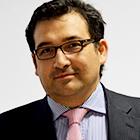The Institute’s Research Group aims to contribute to the exchange of ideas and updates on market practice in the field of quantitative finance. Through collaborative research CQF academics help shape the quantitative modeling and techniques employed by practitioners.
We actively engage with CQF alumni who pursue modeling and research and invite members of the Institute to work with us.
We welcome Institute members who are involved in a particular area of research to get involved and contact us. Please state your area of interest and the faculty member you would like to work with.
Dr. Richard Vladimir Diamond has seven years of experience in statistics teaching and application. He advises family offices on private equity, asset allocation, investment performance and effectiveness of hedges. Richard designs and executes trades – his specialties are volatility regimes modeling and VIX futures arbitrage.
In 2011, he completed a postgraduate certificate in learning and teaching at University College London, conducting a two-year advanced study of threshold concepts in quantitative finance. Richard achieved Fellowship recognition from The Higher Education Academy in the UK.
Back in 1997, Richard began to work with Russian stock exchanges as IT support; in 2000, he graduated with the five-year qualification of Certified Systems Engineer, a computer science degree. Richard earned his doctorate from the University of Southampton, studying complexity and project risk of IT operations in banking. Since 2005, he has been teaching in operations management, statistics and financial mathematics, recently at Cass Business School, City University and Regent’s College. Richard edited a customized textbook in quantitative business analysis.
Areas of research:
- Statistical techniques used in quantitative finance
- Multi-factor model calibration, term structures
- Robust estimation and optimisation
- Statistical arbitrage and cointegration
- Volatility regime modeling
- Credit risk market indicators
- Threshold concepts in quantitative finance

Sébastien Lleo is a professor of finance at Reims Management School in France, a lecturer on the Certificate in Quantitative Finance (CQF) at Fitch Learning in the UK and a visiting lecturer at the Frankfurt School of Finance and Management in Germany. Previously, he held a research position at Imperial College London in the UK. Before that, he worked seven years in the investment industry in Canada and held consulting positions.
He holds a PhD in mathematics from Imperial College London (UK), a MBA from University of Ottawa (Canada), and a MSc in Management from Reims Management School (France). He is also a CFA Charterholder, a Certified Financial Risk Manager (FRM), a Professional Risk Manager (PRM), and a CQF alumnus.
Areas of research:
- Portfolio selection
- Dynamic investment management
- Investment strategies
- Behavioural finance
- Stochastic control
- Stochastic programming
- Risk management
- Financial disasters
- Risk and uncertainty

Peter gained a Masters’ Degree in Mathematics from Oxford University in 1976 and a Masters’ Degree in Econometrics from London University in 1980. He qualified as a Chartered Accountant with Deloitte Haskins and Sells in 1979 and has spent over 30 years working in the City of London in audit, regulation and risk management. Peter completed the CQF course in 2003.
From 1994 until 1999 Peter worked with Credit Suisse as head of their European regulatory unit and introduced the Basel II financial reforms. He worked with First Union National Bank/Wachovia/Wells Fargo from 2000 until 2011 in senior risk management and leadership roles. He has also worked as Head of Risk and Research for the trade body ISDA.
During the early days of regulation, Peter worked with predecessor bodies to the Financial Conduct Authority (“FCA”) and wrote the financial conduct rules for the futures and options industry. He also worked with the Serious Fraud Office and led a significant part of the BCCI inquiry as a trained forensic accountant.
Areas of research:
- Causes of the 2008/2009 Banking crisis
- The Overnight Index Swap ("OIS") market
- CVA, DVA and FVA
- Basel III and CRD IV
- The OTC market
- The Basel Committee's Fundamental Review of the Trading Book

Dr. Alonso Peña is Associate Tutor for the CQF, where he teaches credit risk, credit derivatives and counterparty credit risk. He is SDA Professor at the SDA Bocconi School of Management in Milan, teaching undergraduate, MBA and Executive courses.
Alonso has also gained a PhD in finite element analysis (PDE numerical solution) from the University of Cambridge in 1997 and the Certificate in Quantitative Finance (CQF) in 2004. He has worked as a quantitative analyst (cross asset, equity, equity baskets, credit derivatives, interest rate derivatives and structured products) for Unicredit Group in London/Milan and Thomson Reuters in Milan/Paris.
Alonso has done research in neuroscience at the University of Cambridge as Research Associate, Senior Research Associate and as a Wellcome Trust Training Fellow in Mathematical Biology. He has recently published the book "Advanced Quantitative Finance with C++" with Packt Publishing UK.
Areas of research:
- Credit derivatives and Counterparty Credit Risk
- Numerical methods for option pricing
- The "New" Derivatives: Weather, Freight, Property
- Fractal analysis of financial time series
- Approximation theory
- Visual representation and analysis of high-dimensional financial data



